Exploring the Unique Shopping Malls of Dubai
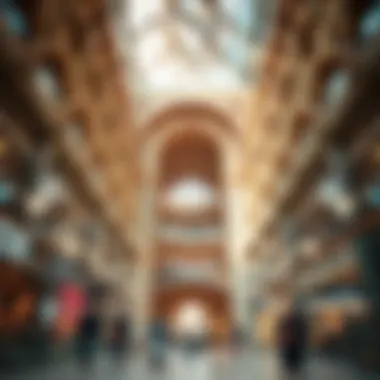
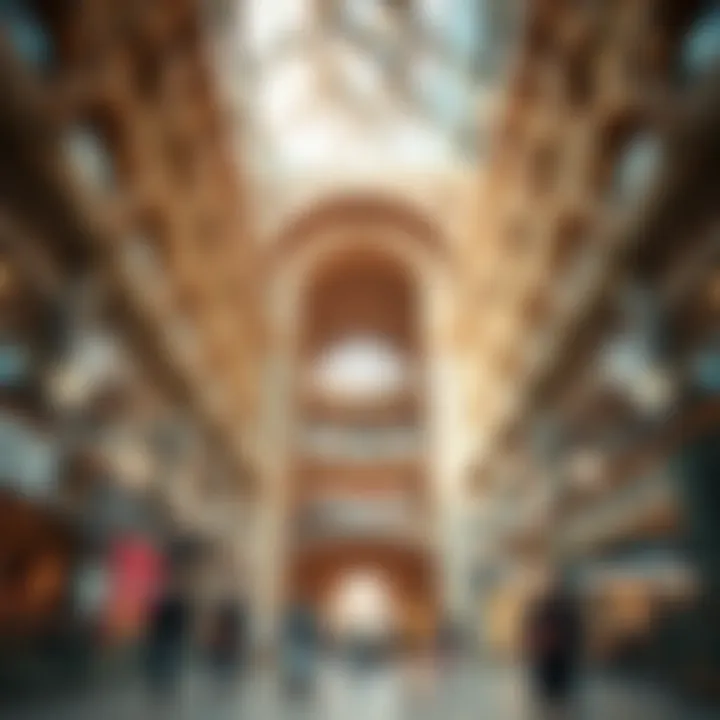
Intro
Dubai's malls are more than just spaces for shopping; they are architectural marvels and cultural icons that reflect the city's dynamic essence. From the massive Dubai Mall, with its countless retail outlets and breathtaking aquarium, to the extravagant Mall of the Emirates, boasting indoor skiing, these destinations cater to an ever-growing population and a robust tourism sector. As these complexes evolve, they are becoming key players in Dubai's real estate landscape, attracting investors with their lucrative offerings. Understanding the intricacies of these malls, their significance in the property market, and their cultural relevance is paramount for stakeholders.
In a city known for its lavishness, the shopping mall stands as a testament to innovation and ambition. The immense diversity in retail options—from luxury boutiques to local artisans—offers a shopping experience like no other. This article aims to provide an in-depth look into the current state of Dubai's mall market, the emerging trends, and what the future holds for both investors and shoppers alike.
As the landscape continues to shift, it's crucial to keep a finger on the pulse of these developments. We will delve into market trends, analyzing the latest movements in the real estate sector, as well as the types of properties that are rising in prominence. This information is not just critical for consumers and tourists but also serves as essential guidance for property agents, developers, and potential homeowners navigating this bustling arena.
Market Trends
Dubai's mall scene is ripe for exploration. As one might say,
The Significance of Malls in Dubai's Real Estate Landscape
Malls in Dubai have become much more than just shopping venues; they have evolved into vibrant urban ecosystems that play a crucial role in the city’s real estate landscape. The importance of these malls extends beyond retail as they influence urbanization, attract investment, and impact cultural integration. Understanding their significance aids investors, property agents, and potential homeowners in navigating the intricate dynamics of property value and consumer behavior around these bustling hubs.
Role of Malls in Urban Development
The role of malls in urban development in Dubai is profound. They serve as central points around which neighborhoods grow and evolve, providing essential services and amenities that enhance the quality of life. These shopping centers often anchor residential and commercial areas, driving demand for nearby housing and services.
- Creating Employment: Malls generate jobs not just from retail but also from construction, maintenance, management, and ancillary services. This economic activity stimulates local economies and fosters community growth.
- Encouraging Public Transport Use: With many malls linked to Dubai's extensive public transportation network, they encourage residents and visitors alike to utilize buses and metros, reducing road congestion and promoting sustainability.
- Fostering Community Interaction: Malls are social melting pots; they bring people together from different backgrounds and cultures, creating spaces for community engagement. Daily interactions and events foster a sense of belonging, enhancing urban livability.
In essence, malls are foundational to Dubai's urban framework. They influence land use patterns, shape economic opportunities, and enhance public life.
Cultural and Economic Impact
The cultural and economic impact of malls in Dubai is interconnected and profound. Economically, malls contribute significantly through retail activities, attracting both local and international brands eager to tap into Dubai's affluent consumer market.
- Revenue Generation: Malls are major sources of tax revenues for the government, which, in turn, funds public projects and infrastructure improvements.
- Showcasing Local Culture: Dubai’s malls often feature elements that reflect its rich heritage while also embracing modernity. For instance, cultural events and exhibitions within malls allow for the celebration of Emirati traditions and arts.
- Attracting Tourists: Iconic shopping venues draw millions of tourists each year, making them integral to Dubai's tourism strategy. Tourist spending in malls often boosts the retail sector, benefiting the overall economy.
"Malls in Dubai not only cater to the needs of the consumer but also serve as cultural landmarks that represent the city’s global identity."
Moreover, malls are becoming increasingly aware of their environmental footprint, adopting sustainable practices that resonate with the growing consumer demand for eco-consciousness. This shift further emphasizes their role not just as economic drivers but also as cultural influencers in promoting responsible consumption. Consequently, as these shopping centers expand, they embody the blend of tradition and modernity, encapsulating what Dubai represents today.
Major Shopping Destinations
Dubai’s shopping malls are more than just retail spaces; they serve as significant cultural landmarks and gathering places for both residents and visitors. These major shopping destinations provide a tapestry of experiences that go beyond conventional shopping. Understanding their unique characteristics is essential for investors and property developers looking at the real estate market. From diverse retail options to entertainment and leisure activities, these malls encapsulate the essence of Dubai’s extravagance.
Dubai Mall: A Global Icon
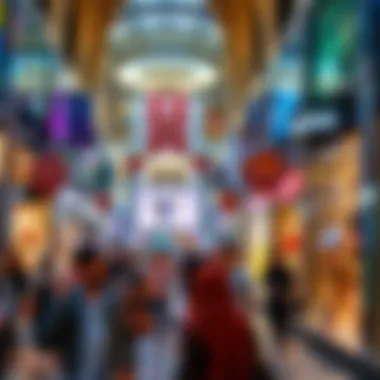
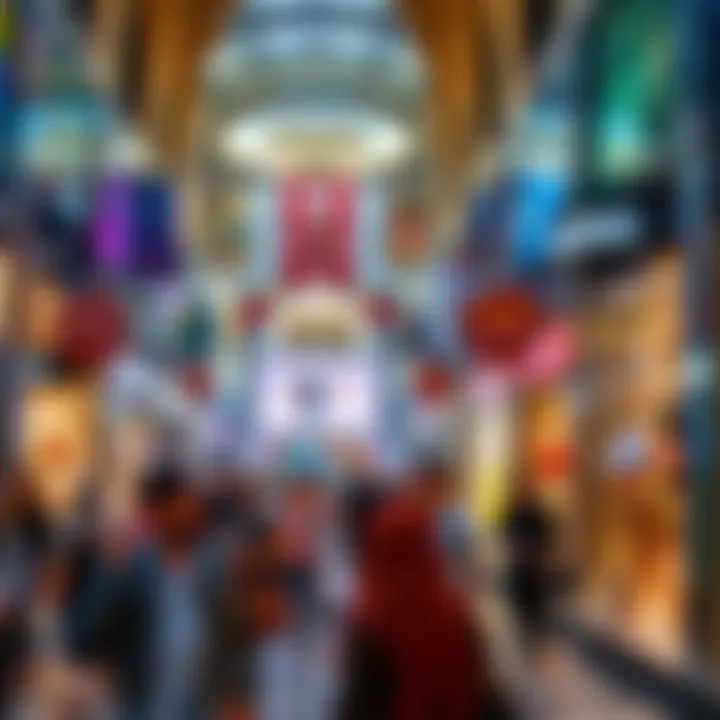
Dubai Mall stands tall as a symbol of luxury and innovation. Spanning over 1.1 million square meters, it is more than just a shopping destination; it’s a colossal experience. With over 1,200 retail outlets, this mall attracts millions of visitors annually. Its glamorous design is complemented by stunning attractions such as the Burj Khalifa, the Dubai Aquarium, and an Olympic-sized ice-skating rink. The sheer scale and array of experiences make it a hotspot for serious shoppers and casual visitors alike.
Diving into the financial aspect, Dubai Mall plays a crucial role in the retail landscape. It attracts high foot traffic, which translates into significant revenue for retailers and substantial investment opportunities for stakeholders. Furthermore, its integration with the surrounding infrastructure boosts property values, making downtown Dubai a lucrative area for investment.
Mall of the Emirates: Luxury and Entertainment
Mall of the Emirates is known for more than just shopping; it’s a venue where luxury meets entertainment. Housing over 600 stores and some of the world’s most prestigious brands, visitors are reminded regularly of the high-life that Dubai encapsulates. One remarkable attribute is Ski Dubai, an indoor ski resort, bringing a unique flair to the desert landscape.
For property investors, the figures are encouraging. The foot traffic here provides myriad shopping opportunities while the luxurious amenities appeal to high-end brands. Moreover, proximity to major residential neighborhoods has the potential to increase property demand, solidifying the mall’s place in Dubai’s luxury retail landscape.
Ibn Battuta Mall: A Journey Through Cultures
Ibn Battuta Mall offers shoppers an unparalleled cultural experience, themed around the travels of the famous explorer. Divided into six sections, each representing a different region—China, India, Persia, Egypt, Tunisia, and Andalusia—this mall stands out as a tale of fashion and adventure.
The distinctive architecture and vibrant decor not only provide a feast for the senses but also encourage a deep connection to history. Investors should note that the cultural theme appeals to a diverse population; thus, the foot traffic is consistent throughout the year. The mall represents a unique niche in Dubai’s retail market, attracting both locals and tourists who appreciate its cultural significance.
City Walk: Fusion of Shopping and Lifestyle
City Walk presents a modern blend of retail and dining, positioned as a lifestyle destination. Featuring a pedestrian-friendly environment, this mall encourages leisurely strolls through a mix of upscale shops and trendy cafes. Its contemporary design and street art installations offer a vibrant atmosphere that captivates both shoppers and foodies.
For homebuyers and real estate agents, City Walk is a significant player. The integration of commercial and residential space leads to an enhanced living experience, driving up property interest. Its urban setting combines shopping with community life, making it a high-demand area for those looking to invest in Dubai's burgeoning market.
"Malls in Dubai reflect the opulence and innovation characteristic of the city. Their architectural designs and diverse shopping experiences elevate them beyond mere retail spaces."
In summary, these major shopping destinations in Dubai serve as key components of the city’s reputation. Their influence on consumer behavior, cultural integration, and real estate dynamics cannot be overstated. Investors looking to capitalize on Dubai’s booming market must keep a keen eye on these vital hubs.
Architectural Marvels of Dubai's Malls
Malls in Dubai are not just retail spaces; they are extraordinary architectural feats that embody the city’s ambition and creativity. These structures are designed to be visually stunning and are crafted to provide visitors with a compelling shopping experience. From soaring ceilings and intricate designs to innovative layouts and sustainable materials, the architectural elements of Dubai's malls contribute significantly to the city’s identity while drawing in tourists and locals alike.
Innovative Designs: Blending Functionality with Aesthetics
The innovative designs of Dubai’s malls reflect a term often applied to advanced architecture: the seamless blend of functionality with aesthetics. Each mall, while serving the primary purpose of retail, doubles as a cultural landmark that invites exploration. For instance, the Dubai Mall features an eye-catching facade with a massive aquarium that captivates passersby, while the interior design invites visitors to wander through its 1.1 million square meters of retail space.
This aesthetic sophistication goes hand-in-hand with practicalities. For example, strategically placed seating areas throughout the malls encourage visitors to relax amidst their shopping spree. Moreover, the layout is meticulously planned to ease traffic flow, minimizing congestion during peak hours.
Visitors can expect amenities like digital information kiosks and spacious walkways that accommodate families and crowds alike, ensuring a pleasant experience for all. This thoughtful approach boosts the mall's appeal to investors, as malls with exceptional designs often lead to higher foot traffic and increased sales.
Sustainable Architecture Practices
Sustainable practices in mall architecture have gained prominence in Dubai, aligning with global trends toward eco-friendliness. Malls like Mall of the Emirates are beginning to incorporate sustainability not just in their operations but in their very designs. From energy-efficient cooling systems to the use of locally sourced materials in construction, sustainability measures are becoming a focal point of new developments.
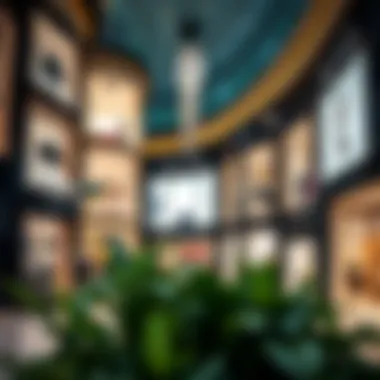
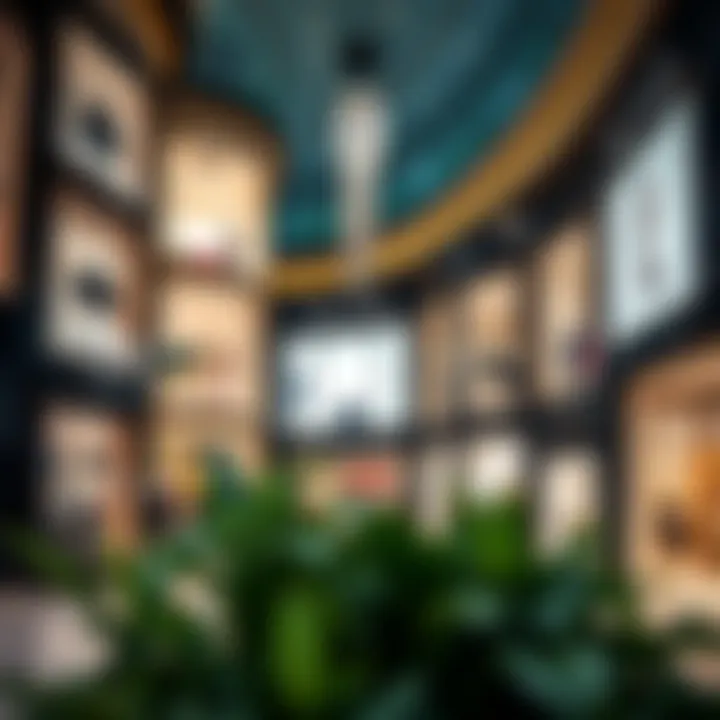
For instance, solar panels are now becoming a common sight on rooftops, generating energy that can be used to power mall operations. Water conservation features, such as rainwater harvesting systems and smart irrigation, are also being integrated into the designs. These eco-conscious practices resonate with environmentally-aware shoppers, thereby enhancing the mall's marketability.
As developers prioritize such practices, they embrace the idea that sustainable malls attract investment and offering a unique selling point that benefits the broader community.
"In designing shopping malls, architects have a unique opportunity to merge practicality with striking aesthetics, all while considering the sustainability of resources used. This fusion defines the future of urban shopping spaces in Dubai."
Retail Diversity and Trends
The dynamic shopping landscape of Dubai encapsulates a plethora of retail experiences, ever-evolving and demonstrating a rich diversity that caters to its cosmopolitan populace. As malls evolve to accommodate an ever-changing market, the trends emerging in retail grow increasingly fascinating. The diversification in this arena not only enhances shopper experiences but also directly influences the investment potential in real estate associated with these retail spaces. Understanding these trends is paramount for investors and property agents aiming to tap into this lucrative market.
Luxury Retail: A Growing Market
In the heart of Dubai's retail scene, luxury brands reign supreme. With an affluent demographic and an interest in extravagance, malls like the Dubai Mall and Mall of the Emirates host world-renowned brands such as Chanel and Louis Vuitton. These retailers capture a segment of the market that drives a significant portion of the overall economy.
Investors need to understand the expanding luxury market. Studies have shown that luxury retail generates higher revenue per square foot compared to more affordable brands. The demand for opulent shopping experiences provides a strong incentive for developers to visualize retail spaces that incorporate high-end stores. This demand is fueled by the influx of tourists and expatriates, shaping the future landscape of luxury shopping in the region.
Local Brands vs. International Chains
The retail environment in Dubai is not just a playground for international brands; local brands are carving out substantial niches too. Majid Al Futtaim and Al Haramain Perfumes are prime examples of homegrown enterprises thriving in these lavish malls. The presence of local brands speaks to a larger trend of consumer preference shifting toward products that reflect cultural heritage.
For potential investors, this blend of local and international enterprises represents a lucrative opportunity. Local brands often foster community loyalty and pride, while international chains bring global recognition. Balancing both types can diversify a retail portfolio significantly, ensuring it appeals to a wide range of consumers.
Emerging Retail Trends: Sustainability and Personalization
The winds of change in retail are blowing towards two pivotal trends: sustainability and personalization. In today's market, consumers are increasingly scrutinizing the environmental impact of their purchases. Malls like City Walk have started integrating eco-friendly practices, creating spaces that focus on sustainable consumption. This trend not only attracts conscientious shoppers but also aligns with global environmental initiatives, something investors should keep their eye on as regulations evolve.
Furthermore, personalization in the shopping experience is becoming paramount. With advancements in technology, retailers are utilizing data analytics to provide tailored experiences for shoppers. For example, loyalty programs that adapt to individual preferences are on the rise. This trend enhances customer satisfaction and encourages repeat visits, an essential factor for mall owners and retailers alike.
"Adapting to these retail trends ensures that malls remain relevant and enticing in a competitive marketplace.”
Real Estate Implications of Shopping Malls
Shopping malls in Dubai are not merely centers for retail and leisure; they hold profound significance in the realm of real estate. The intersection of these two domains illustrates a critical relationship influencing broader economic trends. Understanding the implications of shopping malls on real estate can provide insightful perspectives for investors, property buyers, and urban planners alike.
Investment Opportunities in Mall Developments
The prospect of investing in mall developments within Dubai presents a tantalizing opportunity. Over the past few decades, the region has experienced astonishing growth, becoming a global hotspot for retail and tourism. Notably, investors often look at malls not just as shopping venues, but as asset sources that can generate substantial returns.
- High Foot Traffic: Malls attract an influx of visitors, which means higher potential revenue from rent and retail sales. Malls like the Dubai Mall and Mall of the Emirates see millions of visitors each year - that’s a goldmine for both retailers and developers.
- Diverse Leasing Options: From large anchor stores to small kiosks, mall spaces cater to a variety of business types. This diversity can diversify risk, allowing investors to benefit from multiple revenue streams.
- Long-Term Contracts: Many retail businesses seek long-term leases, providing investors stability in income, a combination attractive to potential buyers in the real estate market.
As the demand for commercial space increases, the surrounding infrastructure often develops in tandem, creating additional investment pathways. This indirect profit can occur through adjacent residential projects or hotels being constructed nearby, further enhancing the appeal for investors.
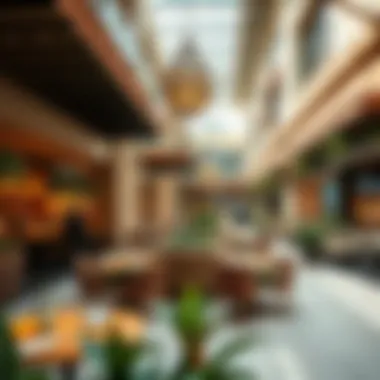
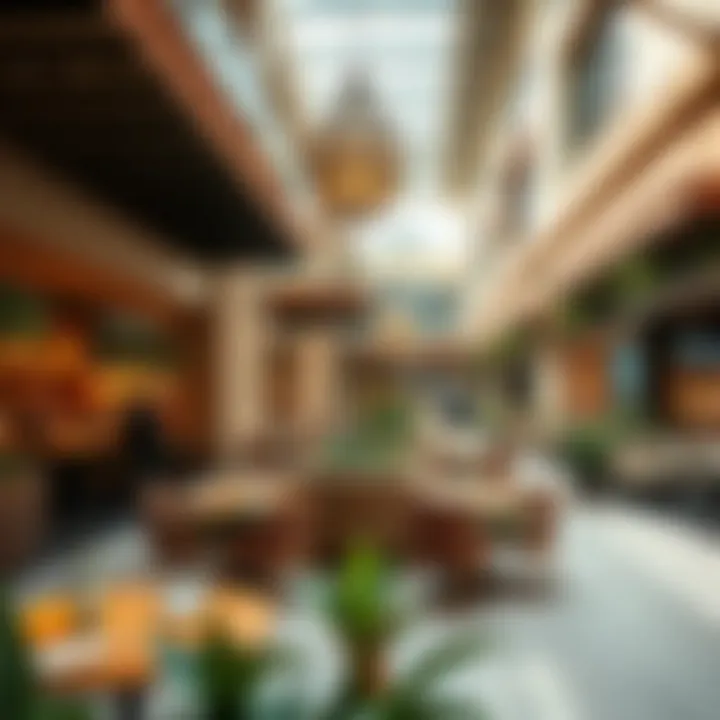
Impact on Surrounding Property Values
The relationship between malls and surrounding property values is another pivotal aspect worth exploring. Generally speaking, the presence of a well-established mall can have a significant positive effect on the local real estate market. When a new mall opens its doors, several changes unfold in the neighborhood.
- Increased Demand for Housing: A mall's opening often signals the need for nearby housing as more people flock to the area for employment or the shopping experience. This uptick in demand can lead to rising property values.
- Enhanced Amenities: Malls bring with them a variety of amenities, from dining options to entertainment venues. This enhancement can improve the overall desirability of living in the vicinity, pushing property values even higher.
- Urban Revitalization: Often, the development of a new mall can spearhead revitalization efforts in previously underserved areas. This can result in broader urban development and consequently, increased property valuations.
"The ripple effect that malls have on their surroundings can fundamentally alter the landscape of a neighborhood, making it essential for investors and analysts to understand the broader implications of these retail behemoths."
In summary, shopping malls act as powerful catalysts in the real estate space of Dubai. By understanding how investment opportunities in mall developments can yield financial returns, as well as how they impact surrounding property values, one can navigate this complex landscape with greater confidence.
To delve deeper into the specifics of investment strategies in retail, consider visiting Britannica.
Future of Malls in Dubai
The future of malls in Dubai is not just about shopping; it’s evolving into a multifaceted experience that integrates lifestyle, entertainment, and social interaction. As consumer expectations shift and technology continues to skyrocket, malls are likely to adapt and thrive in this fast-paced environment. While traditional shopping may be at the heart of these structures, an array of elements will dictate what Dubai’s malls will look like in the coming years.
Adapting to Changing Consumer Behaviors
In today’s world, consumers are not merely looking for a place to buy their goods; they seek experiences that resonate with their values and lifestyle. The rise of social media has fueled this need for interaction and connectivity. People flock to places offering not just products but environments where they can create memories. As a response, many malls, such as the Dubai Mall, are embracing this shift by introducing experiential zones that offer activities like virtual reality experiences, art exhibitions, and culinary classes.
- Experiential Zones: Malls are carving out corners for activities that forge community and enhance engagement.
- Sustainability: Green practices are becoming fundamental, aligning with consumer concerns about the environment. Retail spaces prioritizing eco-friendly initiatives are likely to win consumers over.
- Health and Wellness Offerings: Post-pandemic, there's a surge in interest towards health, driving malls to house gyms, organic cafes, and wellness centers.
"In a world that’s connected, the consumer is seeking more than just a product; they desire a narrative, a connection."
This shift necessitates that mall owners rethink their strategies, focusing on value-added services beyond mere shopping. Those who can successfully adapt will forge deeper connections with their customers, proving to be resilient in the face of changing trends.
The Role of Technology in Retail
In an era where smartphones and the internet dictate shopping habits, technology is undeniably a game changer for malls. The evolution of e-commerce has raised the stakes, pushing brick-and-mortar retailers to innovate or get left behind. Technologies such as artificial intelligence, augmented reality, and data analytics are set to redefine the retail landscape.
- Interactive Displays: Malls will likely feature interactive kiosks that provide personalized recommendations based on consumer behavior. This integration enhances the shopping experience by treating each visitor as a unique case.
- Contactless Payments: As cleanliness takes precedence, contactless payment systems will become more common, streamlining the buying process and making it safer for consumers.
- Virtual Shopping Assistance: Malls will explore the integration of chatbots on their websites and mobile apps, enabling personalized assistance and enhancing customer satisfaction.
As these technologies come into play, malls that leverage them effectively will not only enhance customer experiences but also optimize operational efficiency. The retail landscape in Dubai is on the brink of a technological renaissance, pushing the boundaries of what shopping means.
Closure
The conclusion draws together the threads of this exploration into the shopping experience molded by the malls in Dubai. With an intricate tapestry of culture, luxury, and architectural innovation, these retail spaces do more than just house shops; they shape the socio-economic landscape of the city. Malls in Dubai are pivotal hubs, not solely for consuming goods but for experiencing a lifestyle and culture that is unique to the region.
Summarizing the Enigma of Malls
To summarize, it is essential to reflect on the multifaceted nature of these malls. They represent a blend of leisure, shopping, and social interaction. Here are some key aspects worth considering:
- Cultural Significance: Malls serve as melting pots of culture, attracting locals and tourists alike. They often host exhibitions and events that showcase the rich heritage of Dubai.
- Economic Drivers: These retail giants contribute significantly to the economy by generating employment, boosting local businesses, and attracting foreign investment.
- Architectural Giants: With their stunning designs, Dubai's malls not only prioritize shopping but also the aesthetic appeal, drawing visitors who appreciate architectural beauty.
- Technological Integration: With the rise of e-commerce and changing consumer behaviors, malls are evolving. Admirably, they are integrating technology to enhance customer experience, from virtual shopping aids to streamlined payment systems.
In essence, malls in Dubai are not mere commercial spaces; they're vibrant ecosystems reflecting the dynamic nature of the city itself. Whether one is an investor seeking insights into the real estate market or a potential homeowner looking for lifestyle options, understanding this pivotal role of malls offers a deeper perspective into the broader market values. For those navigating this landscape, the importance of these retail havens cannot be overstated. By grasping their cultural, economic, and social implications, individuals can better appreciate the opportunities that lie ahead in Dubai’s enticing mall scene.















